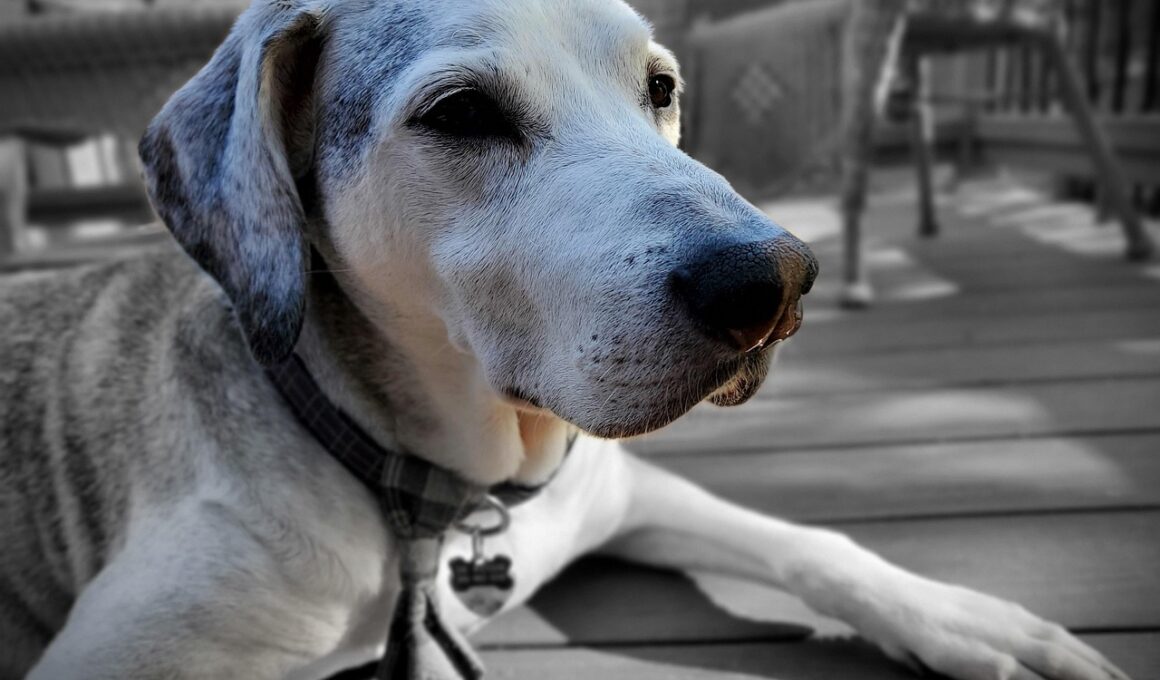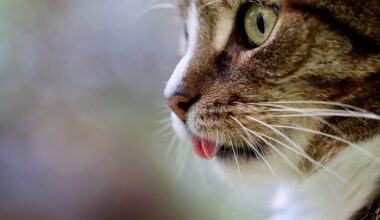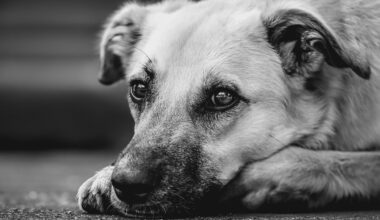Dehydration Warning Signs in Senior Dogs
Dehydration in senior dogs is a serious concern for pet owners. It’s essential to monitor your dog for signs of dehydration, which can lead to severe health issues. As dogs age, they may lose their ability to regulate body fluids effectively. This loss can be exacerbated by factors like heat, illness, or certain medications. Understanding the symptoms can help you act quickly in ensuring your dog’s health. One common sign is dry mouth and gums, which can be a clear indicator of fluid loss. Additionally, a decrease in appetite may accompany dehydration. Always be cautious and monitor their water intake, especially if they are eating dry food. Furthermore, observe the skin elasticity by gently pinching the skin on the back of their neck. If it doesn’t return quickly, dehydration could be the issue. Regular check-ups with your veterinarian are also crucial in maintaining your senior dog’s hydration levels. Interaction with other dogs in parks can also affect hydration needs. Watch closely for excessive panting or lethargy, as these can worsen quickly in senior dogs.
Another prominent sign of dehydration is decreased energy or lethargy. Dogs that lack hydration may not have the same zest for life as they typically do. They may hesitate to engage in activities they once enjoyed, such as playing or going for walks. You might notice they seek cooler areas to lie down or rest more than usual. Pay attention if your senior dog is drinking less water than normal. Monitoring their water bowl can help, and ensuring they have access to fresh water each day is vital. Also, check for sunken eyes, which can be another alarming symptom. If your dog displays these signs, they may become weak without the necessary fluids. Furthermore, if your pet is experiencing vomiting or diarrhea, these conditions can accelerate fluid loss immensely. These symptoms merit a visit to your veterinarian as they can lead to critical situations. Urinary changes can also indicate dehydration in senior dogs. Less frequent urination can suggest fluid deficiencies. Therefore, observing your dog’s bathroom habits is critical in identifying any potential dehydration.
Further Impact of Dehydration
Fluid loss can have numerous detrimental effects on your senior dog’s overall health. It may hinder their ability to maintain body temperature, putting them at risk for heat-related consequences. Dehydration can also affect organ function, leading to complications such as kidney failure if left untreated. The risk of urinary tract infections can increase with dehydration, posing ongoing discomfort. Be aware of your dog’s breathing patterns, as rapid breathing may accompany dehydration and signify distress. Additionally, take notice if there are any signs of disorientation, confusion, or unusual behavior. These can be initial signs that your dog is experiencing severe dehydration. It’s not only essential to recognize these symptoms but also to implement changes in your dog’s hydration habits. Increase the amount of water accessible to your dog. Consider using pet water fountains that encourage drinking or adding moisture to their food with broth or water-soaked kibble. Regular engagement in physical activity is also beneficial. However, be cautious during the hottest parts of the day, as heat can exacerbate the risk of dehydration. Prompt attention can ensure your furry friend lives a happy, healthy life.
If you suspect your senior dog is dehydrated, consult your veterinarian without delay. A medical professional can determine the seriousness of the situation promptly. They may perform physical examinations and suggest further testing if needed. Blood tests or urinalysis may reveal crucial information about your dog’s hydration status and overall health. Based on these tests, your veterinarian will provide guidance on proper hydration techniques tailored to your dog’s specific needs. In some cases, they may recommend administering fluids subcutaneously as a short-term measure. It’s important to follow their directions closely when implementing any treatments or changes to your dog’s routine. Educational resources like pet care books and reliable websites can provide additional information. Be proactive in learning more about canine health and the importance of hydration. Don’t hesitate to ask about proper nutrition that includes moisture-rich food options. Training your dog to drink water regularly can prevent dehydration. While monitoring your dog for signs of dehydration, don’t forget to check their energy levels. A proactive approach to hydration will help maintain your companion’s vitality for years to come.
Helpful Tips for Prevention
Preventing dehydration in senior dogs requires a proactive and thoughtful approach. Ensure fresh water is available at all times. Sometimes, older dogs may forget to drink; therefore, try encouraging them to drink more by using flavored water or broth. Adding moisture to dry kibble can also entice them to consume more fluids. It can be beneficial to transition your dog to a wet or canned food diet as they get older. This change can provide additional hydration. Establish a routine for hydration breaks, especially after playtime or walks. Frequent reminders about evaluating their water intake can significantly impact their hydration levels. During hot weather, limit outdoor activities and ensure shaded areas are available. Ice cubes in their water bowl can make drinking fun while keeping them cool. In other cases, adding ice cubes to their water can provide a refreshing twist. Monitor for early signs of dehydration consistently. Keep track of any changes in behavior, appetite, and bathroom habits as they can provide early warnings. Making a habit of active observation ensures your dog remains healthy, hydrated, and happy.
Sources of hydration can improve your senior dog’s overall wellbeing. Regular visits to your vet can lead to better management of hydration through tailored diet recommendations. Discussing your dog’s specific hydration needs depends on factors such as weight, activity level, and health status. Veterinary professionals can guide you in understanding how much water your dog should consume daily. Incorporate water breaks during exercise or playtime, especially on hot days. Small, consistent hydration habits significantly benefit senior dogs. Familiarize yourself with making hydration appealing to your dog. For example, consider using slow-feed bowls or fountains that encourage drinking. You may also add water to their regular food, ensuring hydration intake increases while eating. Dogs may not drink as much when traveling, so packed water should be non-negotiable on outings. If dehydration is suspected during travel, offer small amounts of water frequently. Monitoring your senior dog’s health closely will allow for proper prevention. Always provide a supportive environment to ensure your dog remains healthy and happy. Observe and adjust their routines accordingly to maintain optimal hydration.
Conclusion and Urgency of Action
The urgency of recognizing dehydration signs in senior dogs cannot be overstated. Swift action can save your dog’s life. Ensuring they have access to adequate hydration is a primary responsibility of any dog owner. As your dog ages, the risk of serious health complications becomes increasingly significant. Regularly implement strategies to monitor their hydration and educate yourself about dog health. Familiarity with hydration practices can ensure a longer, healthier life for your furry friend. Always prioritize regular vet visits to identify any potential issues early on, including dehydration. Depending on their age and individual needs, your dog may require specific adjustments to their routine. Remember to check for signs of dehydration, including lethargy, dry gums, or skin elasticity changes. Engaging in preventive measures will go a long way in keeping your senior dog happy. Enhanced hydration practices contribute to your dog’s comfort and health throughout their life. A few adjustments in daily care can lead to remarkable differences. Keeping your senior dog well-hydrated will ensure companionship lasts longer, making every moment count.


